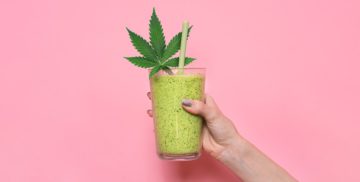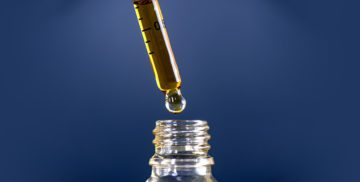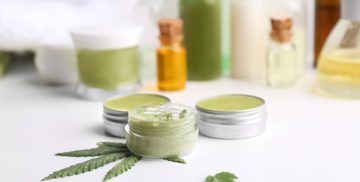Going to bed early only to find yourself awake hours later is incredibly frustrating, can CBD help with your sleep habits?.
Stress, overthinking, or pain can prevent you from getting a good night's sleep, and in this age of time poverty dealing with these nocturnal disturbances is essential.
Sleeping pills such as sedatives or hypnotics may work, but with side effects ranging from headaches to potential accidental overdose, more and more people are searching for safer alternatives with some scientists suggesting CBD may be the solution.
Understanding CBD Oil
Cannabidiol (CBD) is the most dominant and medicinally potent of the over 120 cannabinoids from the cannabidiol-rich hemp and marijuana plants. It is extracted primarily from strains that contain only a negligible amount of the psychotropic tetrahydrocannabinol (THC) cannabinoid and as a result, will never produce any euphoric ‘high’ feeling typically associated with cannabis.
CBD works by interacting with receptors located throughout the human body in what is known as the endocannabinoid system (ECS). A molecular signaling system that promotes wellness by regulating biological systems.
Cognitive and physiological processes including mood, memory, inflammation, and sleep are all regulated by the ECS, but lack of sleep is shown to cause dysregulation which can only be restored by receptor activity by cannabinoids such as CBD.
What Is The CBD Oil Extraction Process?
Cannabidiol comes almost solely from the flowers and leaves of the cannabis plant where it is contained in microscopic hair-like resinous glands known as trichomes.
There are numerous ways to extract cannabinoids from the plant material including:
- Supercritical CO2 extraction in which CO2 (think fizzy drinks) is put into a supercritical form whereby it behaves like a gas and a liquid simultaneously. It is then passed through the plant material and evaporated, leaving only the oil.
- Butane Extraction (BHO) or Propane Extraction (PHO) is achieved by passing either butane or propane gas through the plant material. The compounds are extracted, followed by evaporation of the gas leaving only the oil behind.
- Alcohol: The plant is soaked in alcohol (e.g ethanol), after which the plant material is removed, the liquid filtered and the alcohol evaporated, leaving only the oil.
- Pressing. Cold Pressing involves placing the plant material inside a machine that contains a screw that applies pressure thereby crushing the plant material and squeezing all the oils out.
All of these methods result in the extraction of cannabidiol oil but can this cannabinoid actually help with sleep?
CBD For Sleep – Can It Actually Help You?
In human studies, CBD oil usage for sleep has been shown to significantly enhance the quality of sleep with most subjects reporting more than 7 hours of uninterrupted sleep. Dream recall was also lowered believed to be as a result of uninterrupted sleep.
CBD oil and edibles such as cbd gummies for sleep interact with receptors, notably Gaba and serotonin receptors located in the ECS which is involved in the regulation of our circadian sleep-wake cycle – the body's internal biological clock responsible for the promotion and maintenance of sleep.
Another facet of cannabidiol is its ability to improve sleep thanks to its anti-anxiety and anti-depressive effects which will calm the mind and, in turn, reduce overthinking thereby helping to promote a faster onset of sleep.
The Short Term Effects Of Using CBD Oil
The onset of the effects of CBD can range from a few seconds to upwards of an hour depending on one the consumption method. Cannabidiol that is smoked or vaped will produce almost instant relief but will be short-lived compared to other methods such as capsules which will take longer to take effect but will last longer.
This potent molecule has a number of potential benefits but here we will only focus on how it can improve sleep, for example:
- Relaxation and calmness
- Improved sleep quality
- Less dream recall
- Nullification of pain
Relaxation and Calmness
CBD anti-anxiety and antidepressant effects create a calming effect on the mind, with the body following suit. This serenity leads to a reduction of excessive thoughts helping with the onset of sleep.
Improved Sleep Quality
Researchers from Brazil showed that CBD oil when taken for sleep improved the quality of sleep for the majority of their participants, most of whom slept for at least 7 hours uninterrupted.
Less Dream Recall – Dreams occur during the crucial REM stage of sleep. Studies show less of an ability to remember dreams upon taking CBD oil for sleep due to the fact that participants remained asleep during this cycle.
Nullification of pain
Cannabidiol has the ability to affect serotonin levels, anandamide levels, and opioid receptors all of which are known to influence our perception of pain.
The short-term effects of using CBD oil for pain relief seem obvious and incredible, but what can you get in the long run?
What Are The Long-Term Effects Of Using CBD Oil?
More information regarding the long term effects of CBD will become apparent as further research is published but to date, we are aware of certain benefits such as:
- Regulation of Circadian Rhythm
- Reduction of Anxiety
- Improvement of sleep quality
- Improved homeostasis
Regulate Circadian Rhythm
Researchers at the University of Mississippi concluded that Cannabinoids are capable of modifying both central and peripheral circadian clocks which may restore circadian rhythms resulting in regular good sleeping habits.
Reduced Anxiety
CBD’s ability to reduce subjective anxiety in trial participants resulted in a clear-headed mind which could resolve issues and stresses faster than an anxiety-ridden person resulting in a greater ability to fall asleep faster.
Improved Sleep Quality
The majority of participants in the Sau Paulo CBD oil for sleep studies reported vastly significant improvements in sleep quality with the majority reporting uninterrupted sleep of over 7 hours.
Improved homeostasis
Cannabinoids such as CBD interacting directly or indirectly with receptors located throughout the body leads to greater homeostasis (health) and elimination of endocannabinoid deficiency syndrome.
The remarkable benefits from this plant compound have resulted in a sharp increase in interest from both academia and commerce quarters resulting in enormous consumer uptake, but should you speak to your doctor first?
Should You Talk To A Doctor Before Taking CBD Oil?
Even though cannabidiol has been shown to have a remarkable safety profile it can nonetheless potentially interact with enzymes in the liver which may result in what is known as a drug on drug effect.
Anyone on prescription medication should consult with their doctor first. CBD can amplify drug dosage, which may lead to a decrease in the number of prescription pharmaceuticals you need to take.
What Will CBD Help You With Exactly?
CBD is a multifaceted compound capable of so much medicinal possibility that it has caused a surge in research, with over 5000 papers written on the subject. It is associated with numerous cognitive and physiological treatments but to put some perspective on this we have highlighted its potential use for sleep disorders.
CBD Oil For Insomnia – Will It Help?
Insomnia is a common sleep disorder often as a result of stress or a traumatic event, making it difficult for a person to fall asleep and to get back to sleep upon waking.
Cannabidiol anti-anxiety and antidepressant effects may calm the mind and improve sleep quality resulting in a longer duration of deep sleep and less possibility of remembering dreams which may be particularly important for those suffering from PTSD.
In fact, a recent 2019 study consisting of 72 adults with primary concerns of anxiety and poor sleep who took CBD showed an anxiety decrease of 79% and an improvement in the sleep of 67%.
CBD For Sleep Apnea – Will It Help?
It is estimated that 1.5m people in the UK suffer from sleep apnea. A disorder that causes breathing difficulties during sleep, causing the person to wake up gasping for air thus disrupting their sleep and resulting in fatigue the next day.
There is no known drug for sleep apnea and the effects of CBD oil for sleep are inconclusive, but perhaps another cannabinoid, ‘THC’, could hold significant promise in treating this frightening condition.
Scientists initially saw how serotonin, acting in the peripheral nervous system, can exacerbate sleep-related apnea and that serotonin antagonist (THC) reduced sleep-disordered respiration in rats and bulldogs.
This was followed by a placebo-controlled study where participants with moderate to severe obstructive sleep apnea were given synthetic THC. The results were reduced apnea, improved self-reported sleep, and greater overall treatment satisfaction.
Scientists believe THC inhibits the excitatory effects of serotonin on nodose ganglion cells. The results showed that stabilized sleep and apnea decreased by 42% in NREM and 58% in REM sleep
Possible Risks and Side Effects Of CBD Oil For Sleep
CBD has been shown to have a remarkable safety profile demonstrating a lack of toxicity in both acute and chronic administration. Clinical research in Brazil documented neither physical nor subjective side effects bar somnolence (sleepiness) being noted in a few participants.
Although rare, the majority of the following side effects were reported during the administration of ‘epidiolex’ (patented CBD formula) to epilepsy patients.
- Somnolence
- Diarrhea
- Changes in appetite/weight
- Drug on drug interactions
Somnolence
A state of sleepiness was reported by subjects who received chronic doses of CBD. In this particular trial, this side effect was wanted.
Diarrhea
This was reported in 10% of patients with epilepsy who were taking CBD in the form of epidiolex. This is quite unheard of in other studies
Changes in Appetite and weight
Again this side effect was reported by epileptic patients using epidiolex where 16% reported reduced appetite and 2% reported weight loss.
Drug-Drug interactions
CBD has the potential to interact with enzymes in the liver which may increase or decrease pharmaceutical drugs in the body. This may result in a need for a reduction of pharma drugs.
Ways To Consume CBD Oil
There is an ever-growing number of ways to get this miraculous compound into your body as a result of its popularity in the UK and worldwide. Every palate and preference is catered for:
Smoking
Smoking involves the combustion or flower or oil in a roll-up or other using paraphernalia and breathed into the lungs. Pulmonary absorption results in a rapid onset of effects often within seconds but effects wane quicker and because of carcinogens combustion is not an ideal choice.
Tinctures
Tinctures are an easy and effective medium for precise dosing. Using a pipette, drops are placed under the tongue where numerous veins quickly absorb the oil into the circulatory system.
Vaping
Vaping is where flower or oil is heated rather than burned. Unlike smoking, no combustion occurs and the experience can be controlled using a vaporizer.
Edibles
Edibles have proven to be incredibly popular as they are easy to take and to make! From CBD gummies to drinks, to hummus and chocolate spread, edibles are everywhere! They will take longer to take effect but will also last longer.
Capsules/Gelcaps
Capsules offer a discreet and precise way to dose accurately. A range of strengths along with a vegetarian option means something for everyone. Effects should kick in an hour after digestion, often lasting up to 8 hours.
Oromucosal
CBD is sprayed into the mouth and gums and quickly absorbed into the circulatory system providing very fast onset of effects.
Intranasal
CBD oil is breathed into the nose where thin mucosa absorbs the oil for fast-acting results.
Rectal suppositories
Rectal suppositories offer a viable option especially for patients with difficulty eating. Absorption and effects take place within the hour and last for typically 6 hours.
Top 5 CBD Oil Products For Sleep Problems
How and when you take your CBD will determine how quickly the effects will take place and how long they will last. Below is a list of the best products and cbd brands on the market, each of which has been 3rd party lab tested for quality.
Arima 5% CBD oil – This 10ml tincture bottle is one of the best cbd oils which contains 500mg of CBD along with other non-intoxicating cannabinoids, is vegan free and even has a fruity raspberry flavor.
CBD Flower – With flower you can taste the aromatic terpenes while your body is absorbing CBD and the other non-intoxicating compounds providing the fastest relief.
ECS complex capsules – 30 capsules containing 25mg of CBD and 5mg of another non-intoxicating potent cannabinoid CBG. Ideal for precise and discreet dosing.
Canavape complete e-liquid – UK manufacture Canavape has created one of the finest CBD e-liquids on the market containing 600mg of CBD and 60mg of CBG. Note: This product does NOT contain nicotine.
CBDFX Gummy bears – 60 organically grown, vegan-friendly gummy bears with 5mg of CBD in each delicious treat. A perfect choice for precise dosing.
Fine and all that it is that we have an abundance of choices but is it actually legal to purchase and consume cannabidiol products in the UK?
But Is It Legal To Take?
Yes CBD oil is legal to purchase and consume in the UK. The rule is that the oil must be derived from the cannabis plant that contains less than 0.2% THC.
A variety of products is readily available throughout the UK but dosage requirements may be harder to come across. However, quick general guidelines do exist.
How Much CBD should you take for sleep?
As CBD is not classified as a medicine but rather a health supplement, diagnosis from health officials is impossible to come by. Rather we must use generally accepted guidelines as well as information from clinical trials.
Starting small and slow is always the best advice and using the below diagram will give you a really good base to work from until you find the dosage right for you.
CBD Dosage for sleep From Clinical Trials:
Clinical trials from Brazil concluded that 160mg produced the greatest subjective effects of participants. In one experiment two adults were given 300mg in the morning and in the evening with one of the participants reporting a better night's sleep.
In another of their experiments, the subjects took 3mg of CBD per kg of weight daily.
Key Takeaways
CBD is a safe compound deriving from the marijuana or hemp plant that has been shown, in both animal and human trials, to aid sleep and recovery.
Cannabidiol interacts with the receptors in the ECS system most notably GABA and serotonin receptors helping to modulate pain and better regulate the body's circadian sleep-wake cycle promoting better sleep.
Cannabidiol anti-anxiety and antidepressant effects calm the mind and, subsequently, increase the potential of a fast onset of sleep as well as a prolonged period of sleep.
Cannabidiol should be considered as a safer alternative to sleeping tablets and from the research available it bodes well that administering this plant compound could result in a better night's sleep and a more rested, happier you the next day.




















